eCommerce: Luxury Goods Market
Prada & Prada Beauty Analysis: Business Model and Global Net Sale
The iconic Italian fashion brand Prada, along with its beauty label, is among the leaders of the global luxury market. Discover online & offline sales, market share and B2B dynamics of Prada and Prada Beauty in the Italian luxury goods market.
Article by Cihan Uzunoglu | May 15, 2024Download
Coming soon
Share
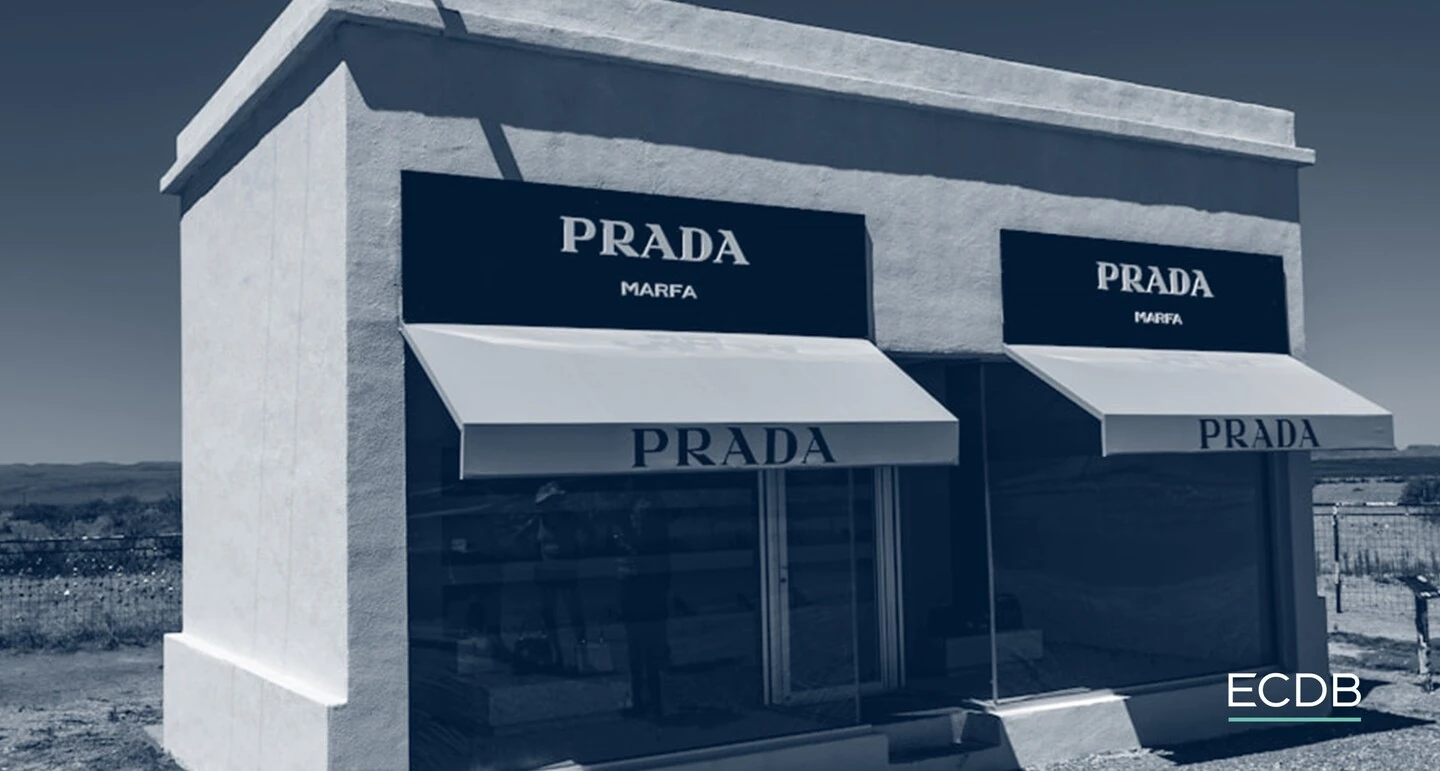
Prada & Prada Beauty: Key Insights
Prada's Legacy: Since 1913, Prada has epitomized luxury, renowned for its leather goods and originality, maintaining its iconic status globally.
Prada Beauty's Digital Supremacy: Prada Beauty, in collaboration with L'Oréal, emerges as a leading force in the beauty market, boasting strong digital sales, securing a top-five spot in online sales with US$1.76 billion.
Shifting Sales Trends: While Prada emphasizes exclusivity with minimal online sales, Prada Beauty shifts towards direct-to-consumer (D2C) strategies, aligning with broader trends in luxury brand engagement.
D2C Surge: Both Prada and Prada Beauty witness a surge in direct-to-consumer sales, reflecting a strategic move towards enhanced customer engagement and control over distribution channels.
Prada, an iconic Italian fashion house founded by Mario Prada in Milan in 1913, is celebrated for its exquisite leather handbags, travel goods and shoes. It's a brand with deep roots and a reputation for originality that secured its luxury status in the 1990s. Today, Prada is a symbol of style and quality, recognized on the catwalks and in city life, where its designs are worn as a badge of fashion savvy and appreciation for traditional luxury.
When it comes to analyzing the market, it's critical to differentiate between a core brand and licensed counterparts. Our recently published Luxury eCommerce Market Report does exactly that, separating Prada from Prada Beauty to provide a clearer perspective on their respective market standings.
Prada Beauty, while part of the Prada universe, forges its own path under a licensing agreement. This collaboration with L'Oréal, specifically the L'Oréal Luxe division, allows for the cherished Prada name to offer a range of personal care products, infusing perfumes and makeup with the brand's signature luxury.
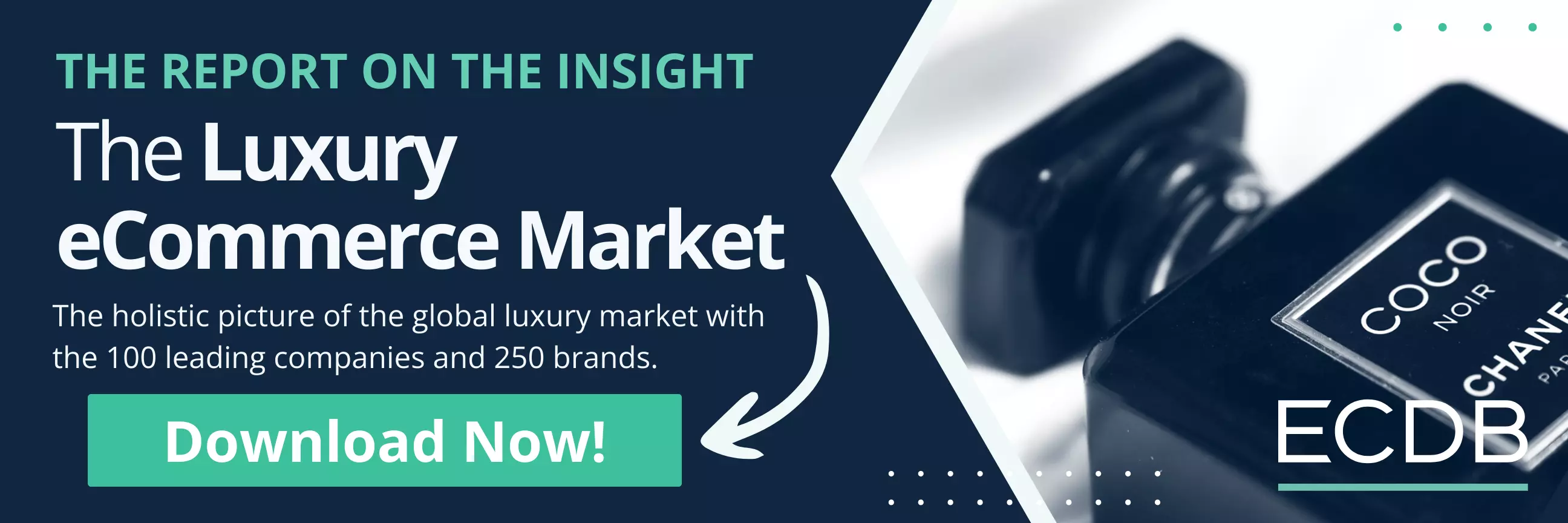
Prada: A Classic Luxury Brand with
High Exclusivity
The ECDB Report on Global Luxury eCommerce, now available for purchase, delivers comprehensive insights into the performance of premier luxury brands, such as Louis Vuitton, Dior and Gucci. This includes a look at Prada and Prada Beauty, focusing on net sales of new, tax-exclusive personal luxury goods, while excluding returns and the pre-owned market.
In our analysis, we consider the total market value of a brand's products, including mark-ups from third-party sales. Entities like Prada Beauty are evaluated separately to accurately reflect their unique profit margins.
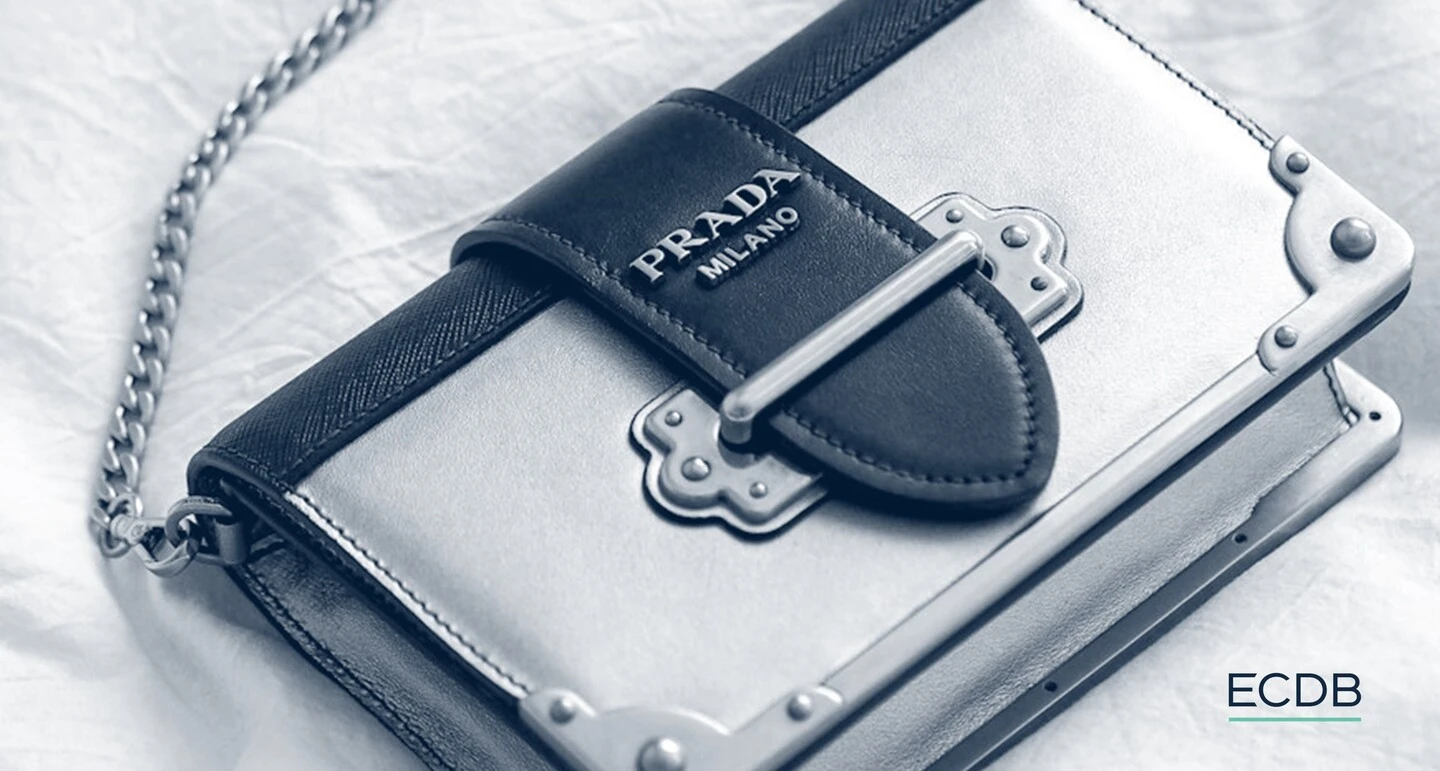
Prada, classified at the “Classic” level for brand positioning, is noted for its enduring legacy that shapes its identity. In terms of exclusivity, which gauges product accessibility, the brand ranks in the high exclusivity tier alongside brands like Gucci. This is based on a comprehensive analysis of various luxury exclusivity indices, placing Prada in the top 40% of global luxury brands.
Luxury Goods: Prada Beauty within Top 5 Brands by Online Sales in 2022
The list of the top 10 luxury brands can vary based on the criteria used for ranking. Here, we're concentrating on online net sales as the key factor. However, our data also allows for organizing the list by overall net sales or other important measures like B2B and D2C earnings.
In the realm of online net sales for 2022, Louis Vuitton leads with US$2.61 billion, followed closely by Lao Feng Xiang with US$2.57 billion, and Coach at US$1.77 billion.
Prada Beauty secures the fourth position with an impressive US$1.76 billion, showcasing its strong digital sales performance. Notably, the same report also lists Prada Beauty as the top luxury brand in the Personal Care products segment, underlining its dominance in this specific market. Prada does not appear on the ranking below, mainly because its business model depends less on online sales compared to Prada Beauty, a point that will be detailed later in the article.
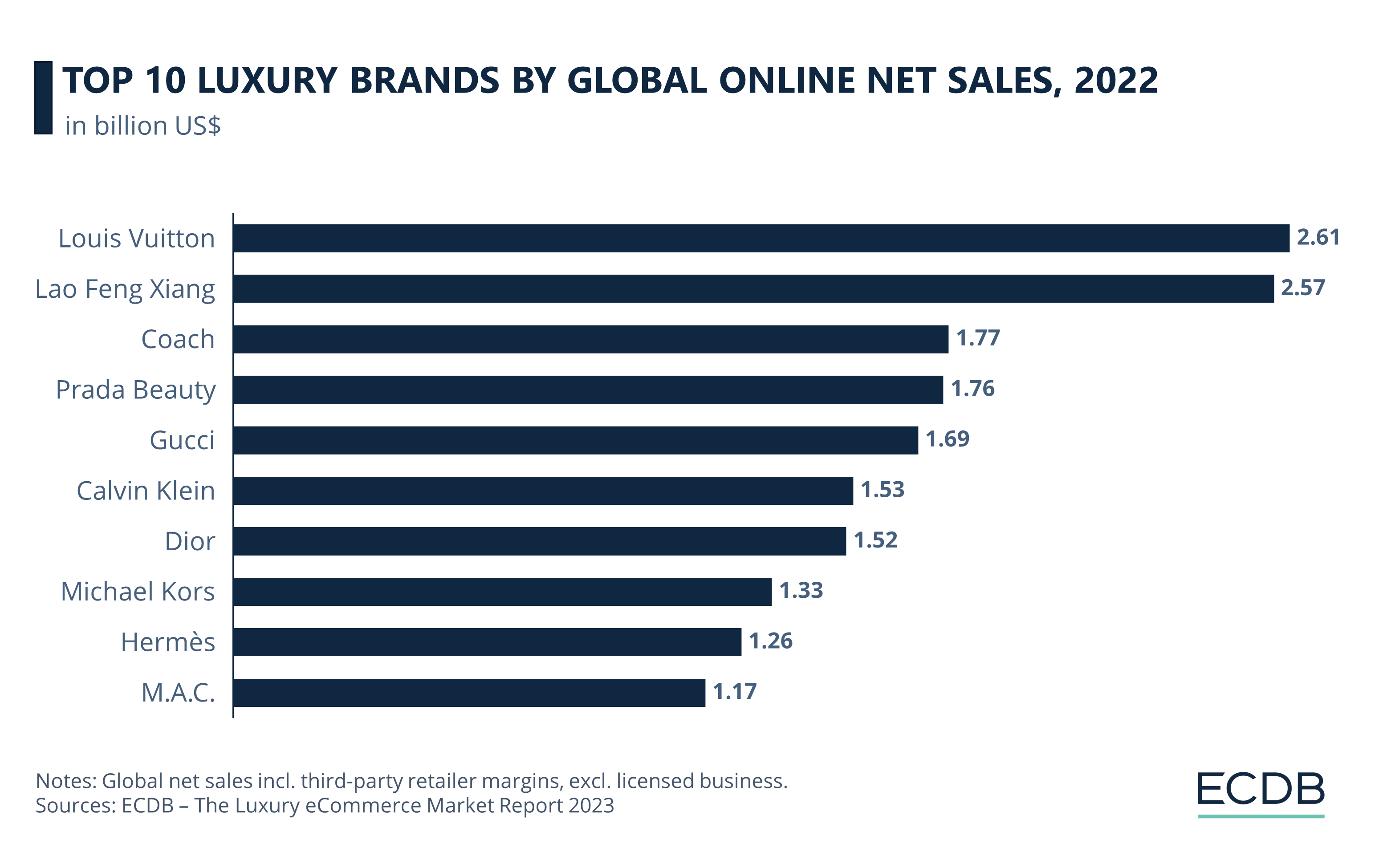
Just below Prada Beauty are Gucci, Calvin Klein and Dior, with all three brands showing strong performances. The list continues with renowned names like Michael Kors, Hermès and M.A.C., each contributing significantly to the luxury online retail landscape.
Prada Beauty: Online Share of
Net Sales Dropped
The following chart outlines Prada and Prada Beauty's revenues from 2020 to 2022, encompassing both their online and offline sales:
For Prada, we notice a consistent pattern where offline sales strongly dominate, maintaining at least a 93% share of total net sales throughout this time period. The online segment, albeit growing, represents a smaller fraction of their business, increasing marginally from 6% in 2020 to 7% in 2022.
Prada Beauty, on the other hand, shows a marked shift towards offline sales. In 2020, Prada Beauty's online sales constituted 31% of their revenue split. By 2021, this share saw a slight decrease to 29% and declined further to 27% in 2022. Conversely, the offline sales share, which was 69% in 2020, grew to 71% in 2021 and increased again to 73% in 2022, indicating a strengthening of Prada Beauty's offline sales channel over this period.
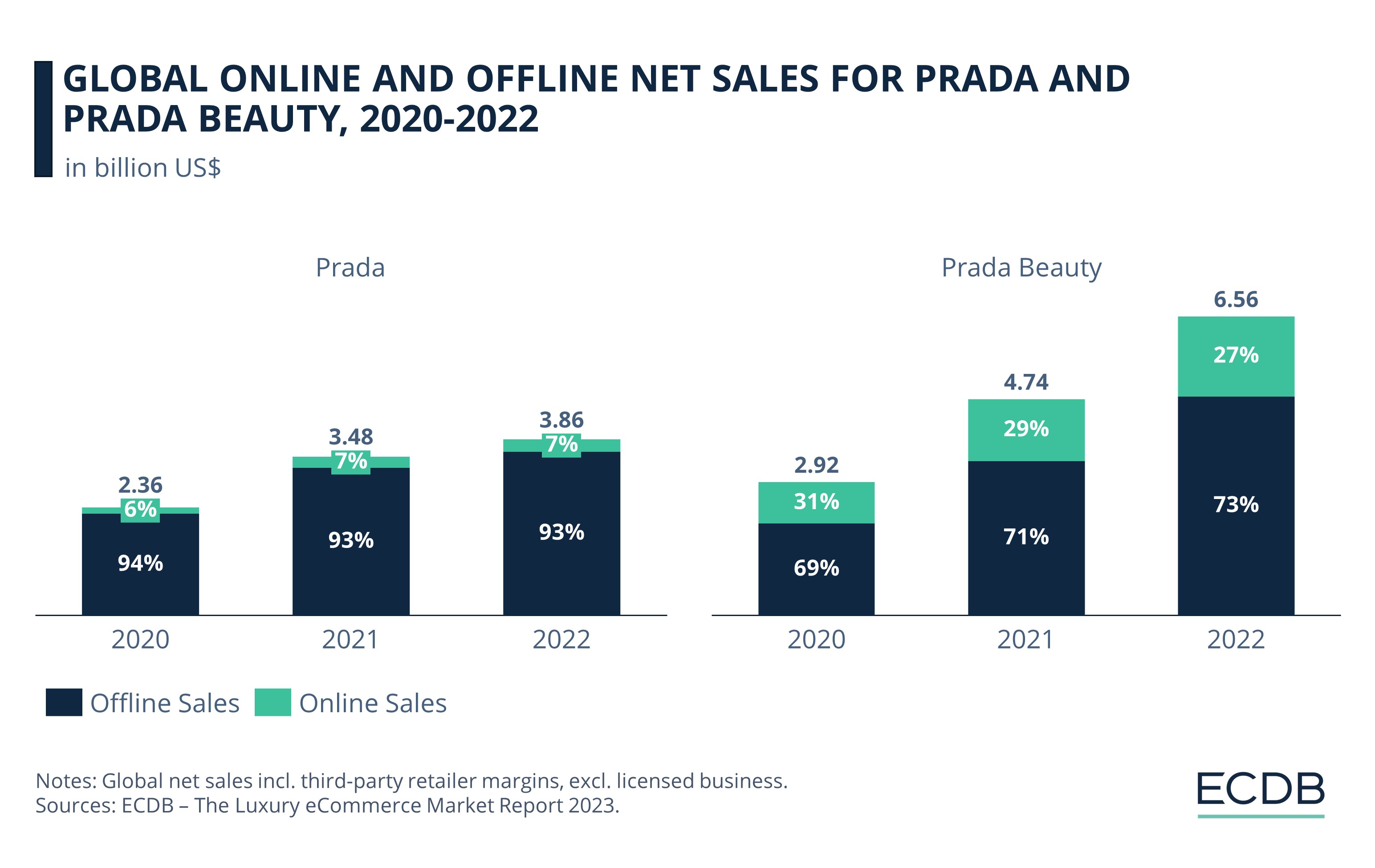
The ECDB Luxury Report sheds light on how the world’s top luxury brands balance their online revenue with factors like exclusivity, positioning in the market, and types of products they offer. An interesting discovery is that the more exclusive a brand is, the less it tends to sell online. Prada, known for its high exclusivity, is a prime example of a brand that generates a minimal portion of its revenue through online channels. However, Prada Beauty operates differently, following a different business model.
Business Model: Prada and Prada Beauty Move Toward D2C
The choice between D2C and B2B models significantly shapes a brand's operational direction and determines its collaboration with various partners for product distribution. Historically, luxury brands have leaned towards B2B, engaging with intermediary retailers who then offer the brand's products to consumers through online or physical stores. However, the tide is shifting, with D2C models gaining prominence. This approach enables luxury brands to exercise enhanced control over the customer journey and the marketing of their products.
Focusing on Prada and Prada Beauty, we observe an evolution in their approach towards B2B and D2C strategies in recent times. The following chart provides a clear depiction of this evolution.
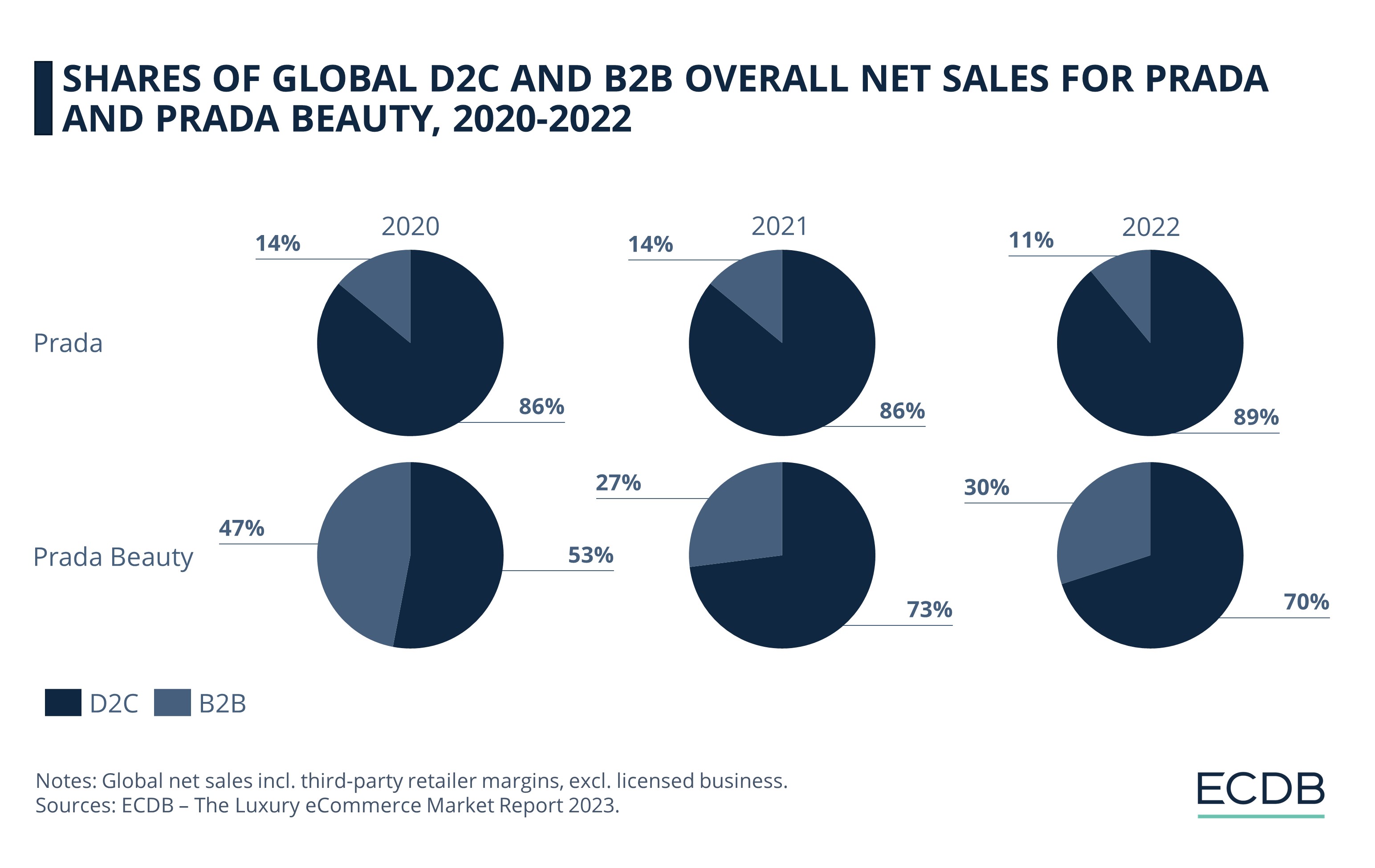
For Prada, in 2020 and 2021, the split between D2C and B2B sales was the same: 86% of their sales were D2C, meaning these sales were made directly to consumers, and 14% were B2B, meaning these sales were made to other businesses. In 2022, there was a slight shift. The D2C sales increased to 89%, while B2B sales dropped to 11%.
Prada Beauty shows a different trend. In 2020, their sales were more balanced between D2C and B2B, with 53% D2C and 47% B2B. However, in 2021, there was a significant change, with D2C sales jumping to 73% and B2B dropping to 27%. In 2022, the figures were somewhat similar to 2021, with 70% of sales being D2C and 30% B2B. This suggests that Prada Beauty has been shifting its focus more towards direct consumer sales in the last two years.

The Luxury eCommerce Market – Available Now!
The 2023 Luxury eCommerce Market Report by ECDB provides the comprehensive data set for 250 leading luxury companies in an additional Excel spreadsheet, which includes sales channels, product categories, brand exclusivity and positioning over the three-year-period from 2020 to 2022.
Order the report here for the full data set, including complete market analysis from our experts.

Click here for
more relevant insights from
our partner Mastercard.
Related insights
Deep Dive
Yoox Net-a-Porter Is Sold to Mytheresa by Richemont: What the Acquisition Means for the Online Luxury Brands
Yoox Net-a-Porter Is Sold to Mytheresa by Richemont: What the Acquisition Means for the Online Luxury Brands
Deep Dive
Cartier Business Strategy: Global Revenue, Ranking, Competitors
Cartier Business Strategy: Global Revenue, Ranking, Competitors
Deep Dive
Forbes Asia 100 To Watch 2024: 9 Retailers to Follow
Forbes Asia 100 To Watch 2024: 9 Retailers to Follow
Deep Dive
Luxury Goods Market: Revenue, Net Sales, Online & Offline Sales
Luxury Goods Market: Revenue, Net Sales, Online & Offline Sales
Deep Dive
Louis Vuitton Analysis: Net Sales, Online to Offline, B2B vs. D2C
Louis Vuitton Analysis: Net Sales, Online to Offline, B2B vs. D2C
Back to main topics